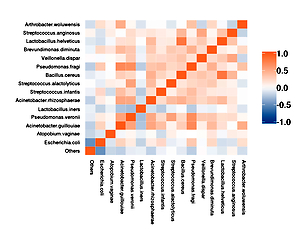Current issue
Archive
Manuscripts accepted
About the Journal
Editorial office
Editorial board
Section Editors
Abstracting and indexing
Subscription
Contact
Ethical standards and procedures
Most read articles
Instructions for authors
Article Processing Charge (APC)
Regulations of paying article processing charge (APC)
UROLOGY / RESEARCH PAPER
Urine flora imbalance and new biomarkers in prostate cancer and benign prostatic hyperplasia
1
Department of Urology, The First Affiliated Hospital of Anhui Medical University,
Hefei, Anhui, China
2
Institute of Urology, Anhui Medical University, Hefei, Anhui, China
3
Anhui Province Key Laboratory of Genitourinary Diseases, Anhui Medical University,
Hefei, Anhui, China
4
Department of Oncology, The Fourth Affiliated Hospital of Anhui Medical University,
Hefei, Anhui, China
5
Institute of Transfusion Medicine and Immunology, Medical Faculty Mannheim,
Heidelberg University, Mannheim, Germany
Submission date: 2020-10-13
Final revision date: 2021-03-18
Acceptance date: 2021-04-02
Online publication date: 2021-04-15
Corresponding author
Chaozhao Liang
Department of Urology, The First Affiliated Hospital of Anhui Medical University; Institute of Urology, Anhui Medical University; Anhui Province Key Laboratory of Genitourinary Diseases, Anhui Medical University, No. 218 Jixi Road, 230000, Hefei, China
Department of Urology, The First Affiliated Hospital of Anhui Medical University; Institute of Urology, Anhui Medical University; Anhui Province Key Laboratory of Genitourinary Diseases, Anhui Medical University, No. 218 Jixi Road, 230000, Hefei, China
KEYWORDS
TOPICS
ABSTRACT
Introduction:
Microbial structure is closely associated with the initiation and development of various diseases. However, the roles of urine flora in prostate diseases, including prostate cancer (PCa) and benign prostatic hyperplasia (BPH), are still unclear.
Material and methods:
In this study, clinical samples were collected from PCa (n = 21) and BPH (n = 19) patients and healthy people (n = 12). The analysis of urine flora DNA sequencing and hematological testing results between groups was performed using bioinformatic methods, including alpha and beta diversity analysis, and functional PICRUSt analysis.
Results:
The results showed that the microbial structure in PCa and BPH differed from the healthy control. Abundance of Escherichia coli was higher in PCa and BPH patients, while probiotics, such as Lactobacillus helveticus and Lactobacillus iners, were lower. Moreover, beta diversity in the PCa group was significantly different from the control group, while alpha diversity was not. Spearman analysis showed that Escherichia coli was negatively correlated with Lactobacillus helveticus and Lactobacillus iners. Functional analysis showed that microbial imbalance was associated with energy metabolism in PCa, and with cell motility, energy metabolism, and intracellular trafficking, secretion, and vesicular transport in BPH. Moreover, microbial imbalance was associated with nervous disorders and infectious diseases in PCa, and with metabolic system, infectious diseases, and signal transduction in BPH.
Conclusions:
Taken together, microbial imbalance may be associated with PCa and BPH. The increase of Escherichia coli was accompanied by the decrease of probiotics, such as Lactobacillus helveticus and Lactobacillus iners. These may be biomarkers for risk prediction and early treatment for prostate disease.
Microbial structure is closely associated with the initiation and development of various diseases. However, the roles of urine flora in prostate diseases, including prostate cancer (PCa) and benign prostatic hyperplasia (BPH), are still unclear.
Material and methods:
In this study, clinical samples were collected from PCa (n = 21) and BPH (n = 19) patients and healthy people (n = 12). The analysis of urine flora DNA sequencing and hematological testing results between groups was performed using bioinformatic methods, including alpha and beta diversity analysis, and functional PICRUSt analysis.
Results:
The results showed that the microbial structure in PCa and BPH differed from the healthy control. Abundance of Escherichia coli was higher in PCa and BPH patients, while probiotics, such as Lactobacillus helveticus and Lactobacillus iners, were lower. Moreover, beta diversity in the PCa group was significantly different from the control group, while alpha diversity was not. Spearman analysis showed that Escherichia coli was negatively correlated with Lactobacillus helveticus and Lactobacillus iners. Functional analysis showed that microbial imbalance was associated with energy metabolism in PCa, and with cell motility, energy metabolism, and intracellular trafficking, secretion, and vesicular transport in BPH. Moreover, microbial imbalance was associated with nervous disorders and infectious diseases in PCa, and with metabolic system, infectious diseases, and signal transduction in BPH.
Conclusions:
Taken together, microbial imbalance may be associated with PCa and BPH. The increase of Escherichia coli was accompanied by the decrease of probiotics, such as Lactobacillus helveticus and Lactobacillus iners. These may be biomarkers for risk prediction and early treatment for prostate disease.
Share
RELATED ARTICLE
We process personal data collected when visiting the website. The function of obtaining information about users and their behavior is carried out by voluntarily entered information in forms and saving cookies in end devices. Data, including cookies, are used to provide services, improve the user experience and to analyze the traffic in accordance with the Privacy policy. Data are also collected and processed by Google Analytics tool (more).
You can change cookies settings in your browser. Restricted use of cookies in the browser configuration may affect some functionalities of the website.
You can change cookies settings in your browser. Restricted use of cookies in the browser configuration may affect some functionalities of the website.



